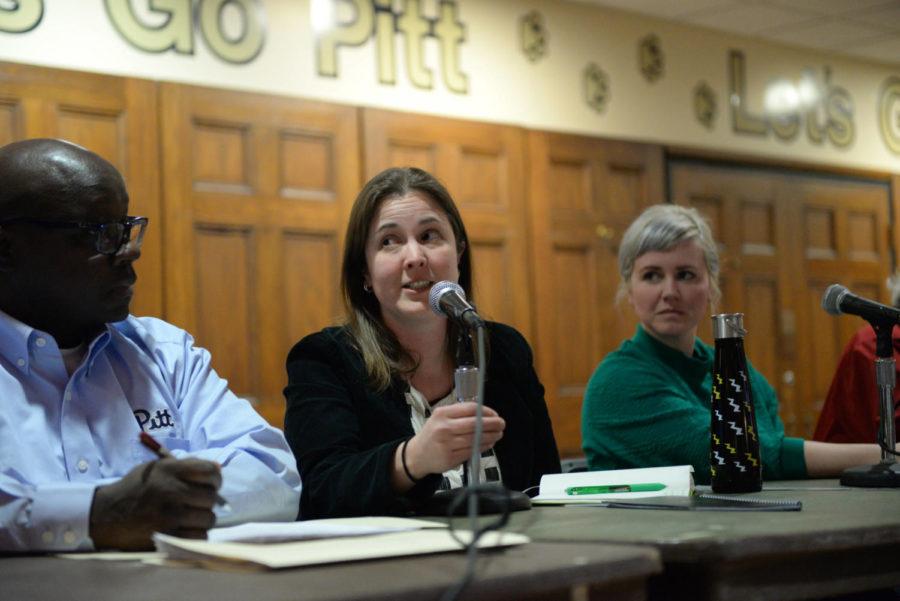SGB will vote on sustainability measures
Hannah Heisler | Senior Staff Photographer
Aurora Sharrard, Pitt’s Director of Sustainability, speaks at a town hall hosted by SGB Tuesday night.
April 3, 2019
Following a 15-minute board meeting, Pitt Student Government Board held its final town hall of the academic year Tuesday night, facilitating a discussion on sustainability.
Before the town hall kicked off, President Maggie Kennedy read off five resolutions to the 40 students in attendance, which the board will vote on next week. These resolutions include inserting a statement of diversity and inclusion in the bylaws, including the position of executive vice president in the terms for tie-breaking, supporting student organizations’ use of Venmo for fundraisers and approving a proposal to raise student activities fees from $80 to $100 per student.
Another one of these resolutions — board resolution 201901 — began the discussion on sustainability by laying out changes to the way students access food.
Junior Clara Grantier, studying environmental studies, worked with SGB to produce this resolution two weeks ago after a meeting with Kennedy and Nick Goodfellow, the sustainability coordinator for Business and Auxiliary Services, who Grantier interns under. She said the resolution isn’t sponsored by the school or Business Auxiliary Services because it’s beyond what they’ve agreed to so far.
“That’s actually the point,” Grantier said. “They don’t think we have student support for this, but actually we do.”
Grantier, who came up with this idea in the summer, said the resolution has four main components.
First, it states that SGB supports making the OZZI machines — which dispense reusable containers — free under a new program called “Choose to Reuse.” Though these machines are currently only located in the William Pitt Union and Schenley Cafe, Grantier said the University will be expanding in the fall.
“There are a lot of benefits this change would have,” Grantier said. “The University spends $40,000 per month on disposable containers which could be going to better mental health resources, lower tuition, better Bigelow Bash performances, you name it.”
The second term of the resolution places a fee on using an unused disposable containers if the option to reuse containers is available. Grantier said the purpose of this is to make reusable products the rule rather than the exception.
The resolution also aims to hold students accountable for returning the reusable containers via a function on their account which charges them if they don’t return the containers. Finally, Grantier said food servers across campus will automatically assume patrons want reusable containers — another initiative to make reusable the default.
“We need the University to pay attention to this,” Grantier said. “They need to recognize that there is a business case for this and that there’s student support.”
Following the reading of the resolution, the board turned the microphones over to a six-person panel of professionals from the University and the City of Pittsburgh. One of these panelists was Alicia Carberry, assistant to the chief operations officer in the mayor’s office.
Carberry addressed some recent updates to the City’s waste and recycling code, noting that it hadn’t been updated for more than 20 years. She, along with other City employees, overhauled the code, focusing on storage and collection and changing the language so that all citizens can read and understand the code.
“The core of the legislation is to make it that much more easy to communicate what’s expected of all residents, whether they rent or own,” Carberry said.
Carberry said the most important adjustment is that under the new code, all property owners are now responsible for providing recycling containers for their residents.
“These provide the space for people to do what’s expected of them,” Carberry said. “If the onus of purchasing those containers is on renters, who may not have the best financial positions or are focusing on things like academics and being a good community member, then it’s one less thing for them to worry about.”
Pitt’s Director of Sustainability Aurora Sharrard also spoke on the panel, highlighting Pitt’s Sustainability Plan. Sharrard said this plan, adopted in January 2018, sets out 61 goals for the University to pursue over 15 impact areas toward achieving sustainability. Some of the goals under this plan include reducing GHG emissions by 50%, increasing tree canopy by 50% and replacing 15% of lawn area with indigenous and adapted plants by 2030.
Sharrard said sustainability depends on balancing equity, environment and economics so that future generations can thrive. She said the University Sustainability Committee — comprised of staff, faculty and students — drafted the resolution after working with a consultant for a year and half to determine the areas on campus which needed the most attention. As a result, the Pitt Sustainability Plan contains three themes for impact areas, including community and culture, stewardship and exploration.
“The goal with materials and waste is to strive for sustainable consumption and diversion practices, so we need to do that across campus by considering sourcing, usage and disposability when you make a decision,” Sharrard said.
Sharrard said students need to place more emphasis on reducing and reusing than recycling because recycling implies the creation and consumption of more potential waste. She proposed tips like analyzing the lifespan of a product before purchasing it and calling out others when they dispose recyclable items.
“If you see something, say something,” Sharrard said. “We will never meet these goals or the outcomes of these goals if we don’t work together to solve these environmental and social problems of our time.”



